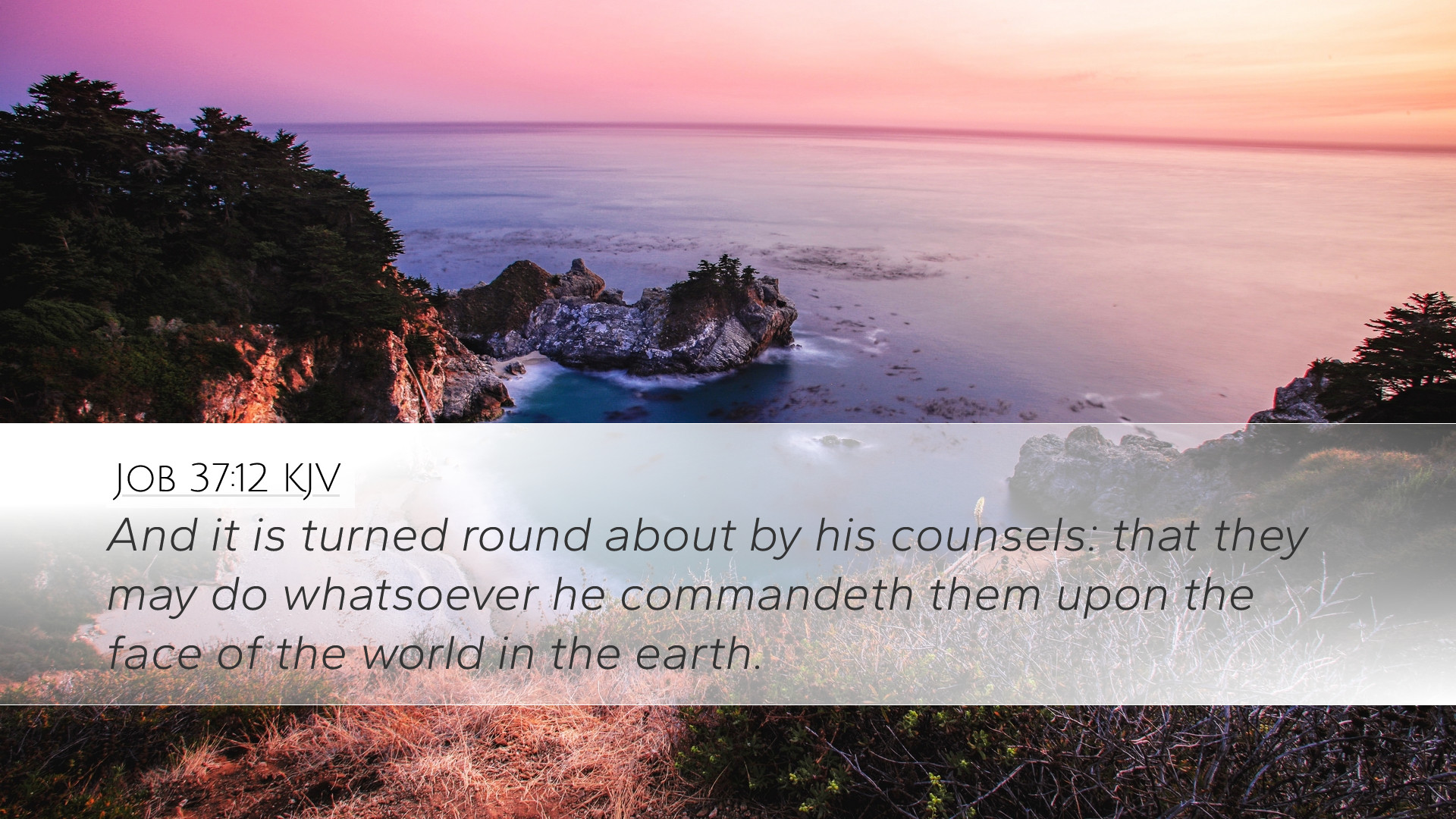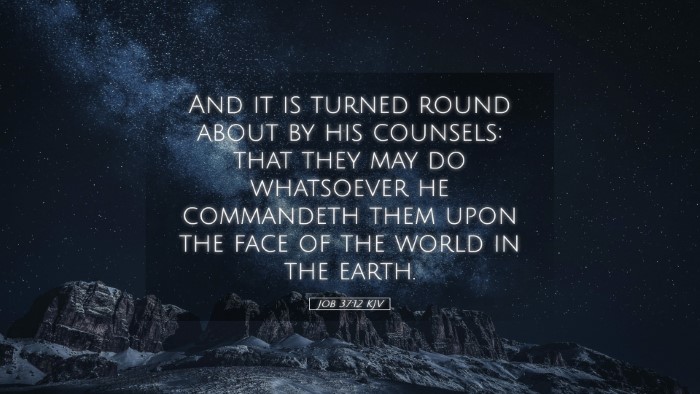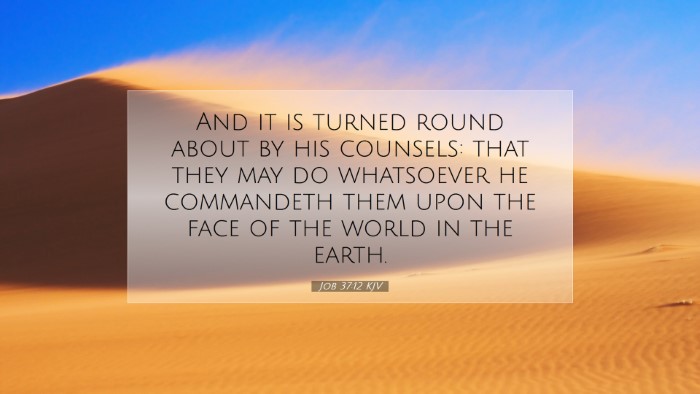Old Testament
Genesis Exodus Leviticus Numbers Deuteronomy Joshua Judges Ruth 1 Samuel 2 Samuel 1 Kings 2 Kings 1 Chronicles 2 Chronicles Ezra Nehemiah Esther Job Psalms Proverbs Ecclesiastes Song of Solomon Isaiah Jeremiah Lamentations Ezekiel Daniel Hosea Joel Amos Obadiah Jonah Micah Nahum Habakkuk Zephaniah Haggai Zechariah MalachiJob 37:12
Job 37:12 KJV
And it is turned round about by his counsels: that they may do whatsoever he commandeth them upon the face of the world in the earth.
Job 37:12 Bible Commentary
Commentary on Job 37:12
Job 37:12 states, "And it is turned round about by his counsels: that they may do whatever he commandeth them upon the face of the world in the earth." This verse encapsulates a profound truth regarding the sovereignty of God over creation and the various manifestations of His will in the natural order.
Understanding the Verse
In this chapter of the Book of Job, Elihu speaks of God's majesty revealed through nature, particularly during storms, which serve as a display of divine power. The focus of Job 37:12 points toward the orchestration of the elements as fulfilling God's purpose and command.
The Divine Counsel
Matthew Henry's Commentary elucidates the idea that God's counsel is not arbitrary but purposeful. Every command from God is executed by His creation—whether it be the winds, storms, or any other natural phenomenon.
- God's Sovereignty: Henry emphasizes that the omnipotence of God ensures that all elements of creation act in accordance with His divine will.
- The Natural Order: The verse highlights how the natural world functions under God's instruction, aligning with the principle that nature reflects the Creator's glory.
The Role of Creation
Albert Barnes further expounds on this verse by illustrating that the storms and their movements are vivid demonstrations of God's authority and control over the universe. Barnes reflects on how the tides of nature are subordinate to God's commands.
- Purpose of Creation: Barnes notes that the actions of the natural world are intentional and aim to fulfill His purposes, reinforcing the theological assertion of God's rule over creation.
- Human Perspective: He draws attention to humanity's often limited understanding of these divine mechanisms, suggesting a need for humility in the face of divine orchestration.
Reflections on Dependency
Adam Clarke takes a reflective approach, interpreting this verse as a reminder of humanity's dependence on God's guidance for all facets of life. Clarke identifies the movement of celestial bodies and meteorological phenomena as manifestations of God's counsel.
- Humility before God: Clarke argues that recognition of God's sovereignty encourages believers to trust Him, especially in times of uncertainty.
- The Assurance in Chaos: He states that even though chaos seems prevalent in our world, it is under the careful watch of God's providential control.
Theological Implications
The insights from these commentators converge on several theological implications:
- The Sovereignty of God: The verse affirms God's absolute control over all things, inviting readers to reflect on the divine order amid the unpredictable events of life.
- The Role of Nature: Nature is not merely an impersonal force but a reflection of God’s glory and majesty, executing His commands with precision.
- Human Address to Divine Power: The passage resonates with the call for humility as humans confront the vastness of divine authority in creation.
- Encouragement for Faith: Recognizing that all events, even chaotic ones, serve a purpose as per divine decree provides comfort and strengthens faith in God's oversight.
Practical Applications
The verse encourages not only theological reflection but also practical application in daily life:
- Trust in God’s Control: Believers are reminded that they can trust God’s plans and purposes, especially when faced with challenges or disasters.
- Acknowledge God’s Sovereignty: Pastoral teaching can guide congregations to acknowledge and celebrate God’s authority and wisdom as revealed in creation.
- Stewardship of Creation: The understanding that nature operates under God’s command highlights the importance of responsible stewardship of the earth.
- Prayerful Dependence: Individuals are encouraged to cultivate a prayerful attitude, seeking God’s guidance in every aspect of life.
Conclusion
Job 37:12 serves as a pivotal reminder of the divine orchestration present in the world around us. By appreciating the insights from Matthew Henry, Albert Barnes, and Adam Clarke, pastors, students, theologians, and Bible scholars can deepen their understanding of God's sovereignty and its implications for faith and practice. Through this verse, a profound respect for God's majesty and a call to humility emerge, inviting believers to grasp the intricate ways in which God remains actively involved in His creation.


